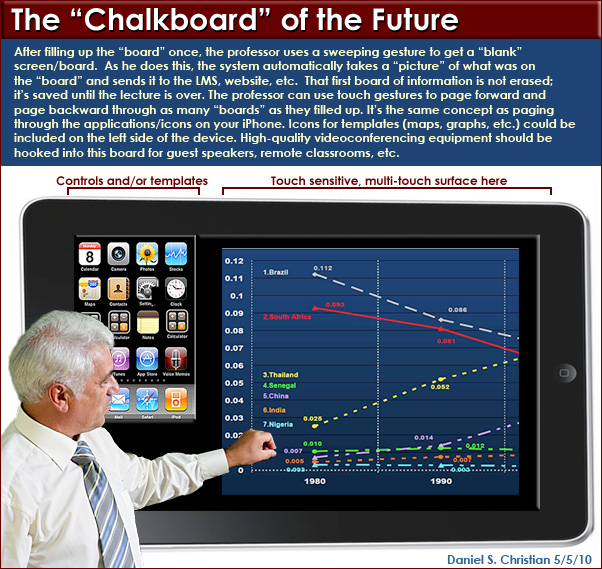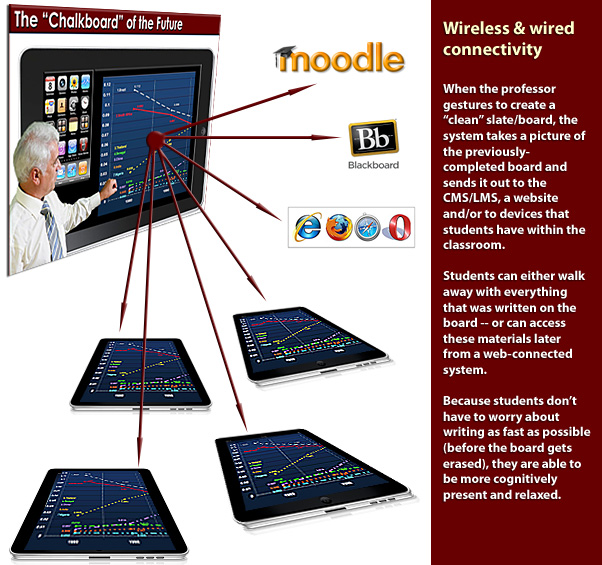
Via:
Accredited Online Universities Guide
Addendum on 2/14/12 — also see:
- Textbooks Redefined –– from inkling.com





Via:
Accredited Online Universities Guide
Addendum on 2/14/12 — also see:
NBC News launches interactive e-book publishing venture — from pcmag.com by Adario Strange
Excerpt:
NBC News plans to launch NBC Publishing, a venture dedicated to releasing interactive e-books for tablets and e-readers.

Via: OnlineEducation.net
Tablet and e-book reader ownership nearly double over the holiday gift-giving period — from Pew Internet by Lee Rainie
Why tablet publishing is poised to revolutionize higher education — from Mashable.com by Trevor Bailey
Excerpt (emphasis DSC):
Richer than their print counterparts, digital textbooks include a number of interactive features. They are not limited to static pictures, but can integrate video, audio, animation, interactive simulations and even 360-degree rotations and panoramas. In addition, universities have the ability to create custom, institutionally branded viewers with unique displays and navigation options.
…
Digital publishing allows professors or subject matter experts to self-publish their own educational materials or research findings and distribute the information on tablet devices. Teachers can iterate content quickly, better keeping pace in a world where knowledge evolves every instant. On a smaller scale, they can post lesson documents online for students, versus relying on hard-copy materials.
.

![]()

.
.
Also see:
Digital Publishing: Interlinking publishing’s future with jobs, books, social media, and English majors [11-2-11 presentation] — published with permission from Steven Chevalia [Steven is a senior at Calvin College and recently did an internship at Zondervan]
Agenda/topics covered:
Addendums later on 11/9/11:
The new normal? Challenges of leveraging the eBook opportunity in K-12 libraries — from The Unquiet Librarian by Buffy Hamilton
Also see:
Apple University will train executives to think like Steve Jobs — from good.is by Liz Dwyer
Excerpt:
If you want to honor Steve Jobs’ life by following in his entrepreneurial footsteps, forget heading to business school. The Los Angeles Times reports that an Apple team has been working on a top-secret project to create an executive training program called Apple University. The goal? To train people to think like Steve Jobs.
…
Apple refused to comment on the existence of Apple University, but the Times says that in 2008, Jobs “personally recruited” Joel Podolny, the dean of Yale Business School, to “help Apple internalize the thoughts of its visionary founder to prepare for the day when he’s not around anymore.” Apple analyst Tim Bajarin told the Times that, “it became pretty clear that Apple needed a set of educational materials so that Apple employees could learn to think and make decisions as if they were Steve Jobs.” Though the curriculum is still under wraps, Jobs himself oversaw the creation of the “university-caliber courses.” (emphasis DSC)
Also see:
Steve Jobs helped plan Apple University — an executive training program to help
Apple carry on without him. (Michael Robinson Chavez / Los Angeles Times / October 6, 2011)
From DSC:
If Apple were to choose to disrupt higher education, several other pieces of the puzzle have already been built and/or continue to be enhanced:
At the least, I might be losing a bit more sleep if I were heading up an MBA program or a business school…
Also see:
Adobe intros iPad app creator for InDesign — from The Journal by Kanoe Namahoe
Excerpt:
Adobe is looking to Single Edition to be an affordable way for freelance designers and organizations of any size to expand their digital publishing efforts, said Todd Teresi, vice president and general manager of Media Solutions at Adobe, in a prepared statement. ” Adding Single Edition to the Digital Publishing Suite family shows Adobe’s commitment to making digital publishing available to businesses of all sizes–from freelance designers to small design firms to large global publishers.”
Indiana U. helps shape economic terms of eText transition — from convergemag.com by Tanya Roscorla
Excerpts:
As course material shifts from print to digital, Indiana University advocates on behalf of students for lower prices, more choices and common software platforms.
…
Based on feedback from students and faculty, Courseload rewrote the platform in HTML5 this summer.
…
When the university asked students why they liked e-textbooks better, 69 percent cited instructor annotations, followed closely by sustainability, cost, weight of books and student annotations.
Presentations from the Digital Book 2011 Conference — from idpf.org with a special thanks going out to Mr. Steven Chevalia — who had pointed me to a great presentation by Liisa McCloy-Kelley:
Learning to Juggle and Picking the Right Balls
(AKA adapting organizations for the future of digital publishing)

Liisa McCloy-Kelley
VP, Director of eBook Production Strategy & Operations, Random House, Inc
Liisa McCloy-Kelley is VP, Director of eBook Production Strategy & Operations at Random House, Inc. where she has been an eyewitness to an evolution in the way that books are produced, marketed and sold for more than 20 years. She currently leads the team responsible for eBook development and production and keeps Random House on a focused strategic path for digital product development. She has spoken at a variety of conferences and has taught at Wellesley, NYU and Yale. As a digital book evangelist, she has given up reading in print form to become an expert in the variety of digital reading systems and the ways they can present content.
Example slide: